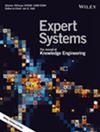深度学习在阿尔茨海默病诊断方面的进展:神经成像方法的全面探索与批判性分析
IF 3
4区 计算机科学
Q2 COMPUTER SCIENCE, ARTIFICIAL INTELLIGENCE
引用次数: 0
摘要
阿尔茨海默病(AD)是全球关注的重大健康问题,影响着全球数百万人。本研究调查了阿兹海默症分析中的技术难题,并对阿兹海默症进行了全面分析,强调了该疾病在全球范围内的影响以及预计的增长。它探讨了与注意力缺失症分析相关的技术难题,重点关注利用核磁共振成像数据进行自动临床诊断从传统机器学习到深度学习技术的转变。这项研究推进了我们对注意力缺失症影响的认识,并为精确诊断提供了深度学习的新发展,为临床和未来研究提供了有洞察力的信息。该研究引入了一种创新的深度学习模型,利用 YOLOv5 和 YOLOv8 的变体,将 AD 图像分为四类(NC、EMCI、LMCI、AD)。本研究对 YOLOv5 的性能进行了评估,YOLOv5 在多类分类(0 至 3 类)中取得了较高的准确率(97%),并报告了每一类的精度、召回率和 F1 分数。YOLOv8(小型)和 YOLOv8(中型)模型也对阿尔茨海默病诊断进行了评估,准确率分别为 97% 和 98%。精确度、召回率和 F1 分数指标详细说明了模型在不同类别中的有效性。与迁移学习模型的对比分析表明,YOLOv5、YOLOv8(小型)和 YOLOv8(中型)在与认知障碍相关的六种二元分类中始终表现优异。与 [32] 的基线架构相比,这些模型的灵敏度和准确性都有所提高。在 AD/NC 分类中,YOLOv8 (Medium) 的准确率和灵敏度分别达到了 98.43% 和 97.45%;在 EMCI/LMCI 分类中,YOLOv8 (Medium) 的准确率和灵敏度也分别达到了 92.12% 和 90.12%。这些结果凸显了 YOLOv5 和 YOLOv8 变体在神经成像任务中的有效性,展示了它们在认知障碍分类临床应用中的潜力。所提出的模型表现出卓越的性能,实现了较高的准确率、灵敏度和 F1 分数,超越了基线架构和以前的方法。对比分析凸显了所提模型在注意力缺陷分类任务中的稳健性和有效性,为未来的研究和临床应用提供了宝贵的见解。本文章由计算机程序翻译,如有差异,请以英文原文为准。
Advancements in deep learning for Alzheimer's disease diagnosis: A comprehensive exploration and critical analysis of neuroimaging approaches
Alzheimer's disease (AD) is a major global health concern that affects millions of people globally. This study investigates the technical challenges in AD analysis and provides a thorough analysis of AD, emphasizing the disease's worldwide effects as well as the predicted increase. It explores the technological difficulties associated with AD analysis, concentrating on the shift in automated clinical diagnosis using MRI data from conventional machine learning to deep learning techniques. This study advances our knowledge of the effects of AD and provides new developments in deep learning for precise diagnosis, providing insightful information for both clinical and future research. The research introduces an innovative deep learning model, leveraging YOLOv5 and variants of YOLOv8, to classify AD images into four (NC, EMCI, LMCI, AD) categories. This study evaluates the performance of YOLOv5 which achieved high accuracy (97%) in multi‐class classification (classes 0 to 3) with precision, recall, and F1‐score reported for each class. YOLOv8 (Small) and YOLOv8 (Medium) models are also assessed for Alzheimer's disease diagnosis, demonstrating accuracy of 97% and 98%, respectively. Precision, recall, and F1‐score metrics provide detailed insights into the models' effectiveness across different classes. Comparative analysis against a transfer learning model reveals YOLOv5, YOLOv8 (Small), and YOLOv8 (Medium) consistently outperforming across six binary classifications related to cognitive impairment. These models show improved sensitivity and accuracy compared to baseline architectures from [32]. In AD/NC classification, YOLOv8 (Medium) achieves 98.43% accuracy and 97.45% sensitivity, for EMCI/LMCI classification, YOLOv8 (Medium) also excels with 92.12% accuracy and 90.12% sensitivity. The results highlight the effectiveness of YOLOv5 and YOLOv8 variants in neuroimaging tasks, showcasing their potential in clinical applications for cognitive impairment classification. The proposed models showcase superior performance, achieving high accuracy, sensitivity, and F1‐scores, surpassing baseline architectures and previous methods. Comparative analyses highlight the robustness and effectiveness of the proposed models in AD classification tasks, providing valuable insights for future research and clinical applications.
求助全文
通过发布文献求助,成功后即可免费获取论文全文。
去求助
来源期刊

Expert Systems
工程技术-计算机:理论方法
CiteScore
7.40
自引率
6.10%
发文量
266
审稿时长
24 months
期刊介绍:
Expert Systems: The Journal of Knowledge Engineering publishes papers dealing with all aspects of knowledge engineering, including individual methods and techniques in knowledge acquisition and representation, and their application in the construction of systems – including expert systems – based thereon. Detailed scientific evaluation is an essential part of any paper.
As well as traditional application areas, such as Software and Requirements Engineering, Human-Computer Interaction, and Artificial Intelligence, we are aiming at the new and growing markets for these technologies, such as Business, Economy, Market Research, and Medical and Health Care. The shift towards this new focus will be marked by a series of special issues covering hot and emergent topics.
 求助内容:
求助内容: 应助结果提醒方式:
应助结果提醒方式:


